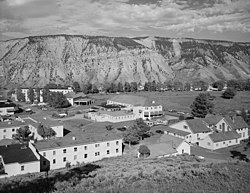Mammoth Hot Springs Historic District
Mammoth Hot Springs Historic District | |
 | |
| Location | Yellowstone National Park, Wyoming |
|---|---|
| Coordinates | 44°58′37″N 110°41′52″W / 44.97694°N 110.69778°W |
| Area | 158 acres (64 ha) |
| Built | 1891 |
| Architect | U.S. Army Chief Quartermaster Office |
| Architectural style | Late 19th and Early 20th Century American Movements |
| NRHP reference No. | 02000257[1] |
| Added to NRHP | March 20, 2002 |
The Mammoth Hot Springs Historic District is a 158-acre (64 ha) historic district in Yellowstone National Park comprising the administrative center for the park. It is composed of two major parts: Fort Yellowstone, the military administrative center between 1886 and 1918, and now a National Historic Landmark, and a concessions district which provides food, shopping, services, and lodging for park visitors and employees. It was added to the National Register of Historic Places on March 20, 2002, for its significance in architecture, conservation, entertainment/recreation, and military. The district includes 189 contributing buildings.[2]
Description
[edit]Fort Yellowstone is a carefully ordered district of substantial buildings that clearly indicate their military origins. The U.S. Army administered the park from 1886 to 1918 when administration was transferred to National Park Service.[3] The park headquarters is now housed in the original double cavalry barracks (constructed in 1909). The Horace Albright Visitor Center is located in the old bachelors' officers quarters (constructed in 1909).[4]
The concessions district contrasts with the military district, with a less formal arrangement and style and includes the Mammoth Hot Springs Hotel and Dining Room, a gas station, and retail stores. The Yellowstone Main Post Office, itself on the National Register of Historic Places sits just north of Fort Yellowstone. The residential area includes houses designed by architect Robert Reamer.[5]
The district is directly adjacent to the Mammoth Hot Springs thermal area, and is itself built on an ancient travertine terrace. The Grand Loop Road Historic District runs through the Mammoth district, and the North Entrance Road Historic District adjoins just to the north.
Gallery
[edit]- Area view of Mammoth Hot Springs
- Mammoth Hot Springs Hotel
See also
[edit]- Fort Yellowstone
- Grand Loop Road Historic District
- Lake Fish Hatchery Historic District
- North Entrance Road Historic District
- Roosevelt Lodge Historic District
- Old Faithful Historic District
References
[edit]- ^ "National Register Information System – (#02000257)". National Register of Historic Places. National Park Service. November 2, 2013.
- ^ Simmons, R. Laurie; Simmons, Thomas H. (September 2000). "National Register of Historic Places Inventory/Nomination: Mammoth Hot Springs Historic District". National Park Service. With accompanying 44 photos
- ^ Hampton, H. Duane (1972). "The Early Years in Yellowstone: 1882-1886". How the U.S. Cavalry Saved Our National Parks. Bloomington, IN: Indiana University Press. pp. 53–80. ISBN 025313885X.
- ^ Kiki Leigh Rydell; Mary Shivers Culpin (2006). "Appendices-A-Government-Built Buildings Constructed in Yellowstone National Park 1879–1973". Managing the Matchless Wonders-History of Administrative Development in Yellowstone National Park, 1872-1965 YCR-CR-2006-03. National Park Service, Yellowstone Center for Resources. pp. 161–174.
- ^ "Mammoth Hot Springs Historic District". National Register of Historic Places. Wyoming State Preservation Office. October 1, 2008.
External links
[edit]- Historic American Buildings Survey (HABS) No. WY-101, "Mammoth Hot Springs-Fort Yellowstone, Grand Loop Road, Mammoth vicinity, Park County, WY", 8 photos, 1 photo caption page
- HABS No. WY-143, "Mammoth Motor Inn, 400' Northwest of Museum & 200' northeast of Cafeteria, Mammoth, Park County, WY", 1 photo, 1 photo caption page
- HABS No. WY-143-A, "Mammoth Motor Inn, Motor Inn Building", 3 photos, 1 photo caption page
- HABS No. WY-143-B, "Mammoth Motor Inn, Cafeteria", 6 photos, 1 photo caption page
- HABS No. WY-143-C, "Mammoth Motor Inn, Boiler House", 3 photos, 1 photo caption page
- HABS No. WY-136, "Hayne's Studio, Southwest of Museum & south of Motor Inn", 3 photos, 1 photo caption page
- Mammoth Hot Springs Historic District at the Wyoming State Historic Preservation Office


 French
French Deutsch
Deutsch



